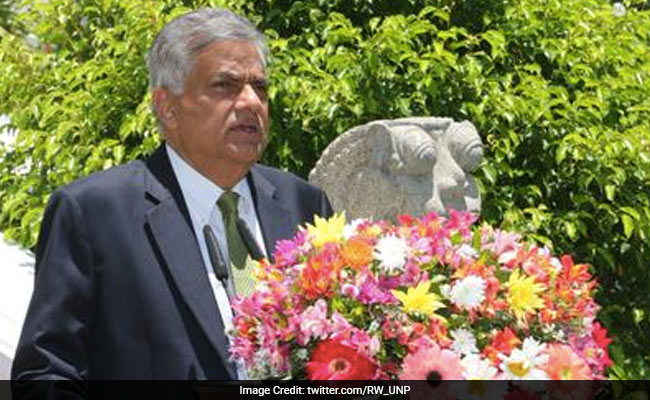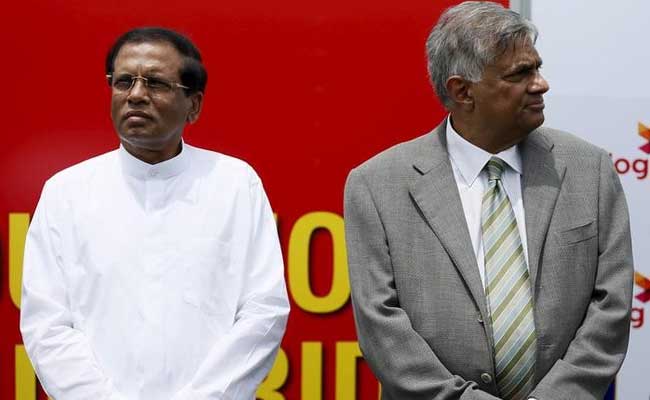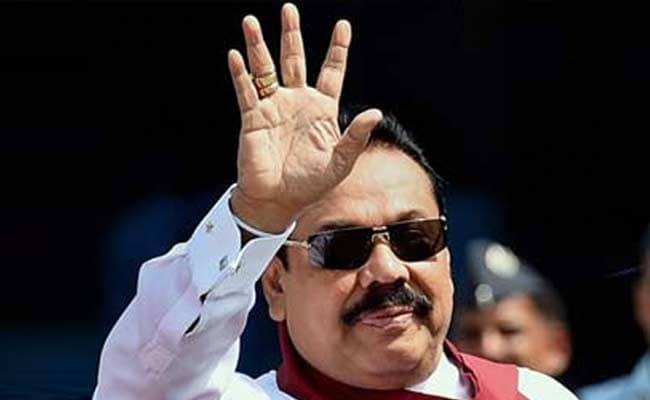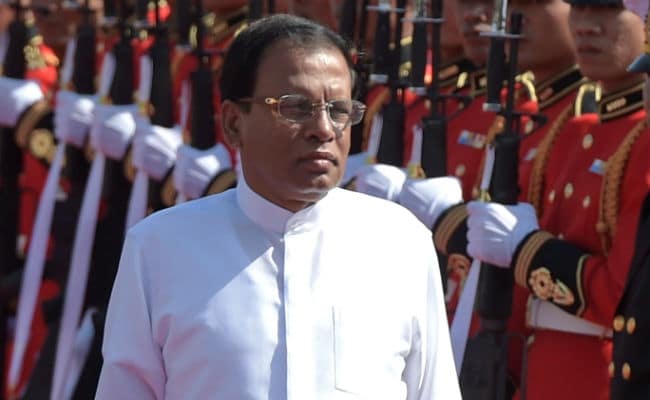After Sri Lanka's President Maithripala Sirisena dismissed Ranil Wickremesinghe as prime minister, replacing him with the island nation's former strongman president Mahinda Rajapaksa, Mr Wickremesinghe has refused recognise his shock dismissal, in an unfolding constitutional crisis. Mr Wickremesinghe continued to occupy Temple Trees, the official residence of the prime minister, and insisted in a letter to Mr Sirisena that he was still in office. He has said that he can be removed only by parliament where his party enjoys a majority. He urged the speaker to convene the parliament on Sunday to prove he still retained his parliamentary majority. Mr Wickremesinghe also vowed to seek legal action against what he condemned as an unconstitutional move against him.
Here are the live updates on the Sri Lankan constitutional crisis:
- Sri Lanka President Maithripala Sirisena suspended parliament until November 16, parliamentary officials said.
- The parliament had been due to meet again on November 5 to unveil the 2019 annual budget.
- The suspension could destabilise government finances at a time when the country faces an economic crisis.
- Ranil Wickremesinghe had earlier called for an emergency session of parliament so he could prove his majority.
 Ousted Sri Lanka Prime Minister Ranil Wickremesinghe Seeks Emergency Parliament Session
Ousted Sri Lanka Prime Minister Ranil Wickremesinghe Seeks Emergency Parliament SessionSacked Sri Lankan prime minister Ranil Wickremesinghe on Saturday demanded the parliament speaker call an emergency session so he can prove his majority, officials said.
Though Maithripala Sirisena and Mahinda Rajapaksa were originally from the same party - Sri Lanka Freedom Party - Mr Sirisena, who used to be Mahinda Rajapaksa's minister of health, broke away from him to contest the presidential elections. He managed defeat Mahinda Rajapaksa within their political alliance - United People's Freedom Alliance, after loyalists of Mr Sirisena formed a coalition government with Mr Wickremesinghe's United National Party.
Mahinda Rajapaksa later formed his own political front, the Sri Lanka Podujana Peramuna.
Mr Sirisena then became President and went on to form a coalition with Ranil Wickremesinghe's party which had the larger mandate.
While Mr Wickremesingh's party still has the numbers in parliament, he has been ousted by President Sirisena, who brought back his former president as his new prime minister.
Political analysts say President Sirisena's move to install Mahinda Rajapaksa as the prime minister could lead to a constitutional crisis as the 19th amendment to the Constitution would not allow the sacking of Ranil Wickremesinghe as the prime minister either, without a majority in parliament.
Mr Rajapaksa and Mr Sirisena together have only 95 seats and is short of a simple majority. Mr Wickremesinghe's UNP has 106 seats on its own, which is just seven short of the majority mark.
The unity (coalition) government (between Sirisena and Wickremesinghe) was thrown into a crisis after Mr Rajapaksa's new party pulled off a stunning victory in local elections in February seen as a referendum on the ruling alliance.
Last week, it was reported that President Sirisena accused his senior coalition partner the UNP of not taking seriously an alleged conspiracy to assassinate him and Gotabhaya Rajapaksa, the former top defence ministry bureaucrat and brother of ex-president Mahinda Rajapaksa.
Sri Lanka nearly faced economic sanctions from the West over Mahinda Rajapakse's brutal military crackdown on the banned terror outfit Liberation Tigers of Tamil Eelam (LTTE).
The LTTE sought a separate Tamil homeland in the northern and eastern provinces of Sri Lanka for nearly 30 years before its collapse in 2009 after the Sri Lankan Army killed its chief Velupillai Prabhakaran.
Mahinda Rajapaksa and his family are facing several cases of corruption and financial irregularities.
Ousted Sri Lanka PM Ranil Wickremesinghe seeks emergency parliament session.
Reacting sharply to his sacking, Ranil Wickremesinghe on Friday said that he will continue to be the prime minister till he enjoys the majority in Parliament. "Only I have the majority. The only way that can be changed is through a no confidence motion or if I resign," Mr Wickremesinghe said referring to the 19th amendment to the Constitution.

Mr Wickremesinghe's United National Party or UNP however, suffered one defection after Mahinda Rajapaksa was sworn in with Ananda Aluthgamage meeting the former president and extending support to him.
The political crisis unfolded after President Sirisena's broader political front United People's Freedom Alliance (UPFA) announced that it has decided to quit the current unity (coalition) government with Prime Minister Wickremesinghe's UNP.
The unity (coalition) government was formed in 2015 when Mr Sirisena was elected President with Prime Minister Wickremesinghe's support, ending a nearly decade-long rule by Mahinda Rajapaksa.

"I had appointed you as the prime minister under (article) 42 (1) of the Constitution and as your appointing authority, I write to notice that you have been removed from the post of prime minister," President Sirisena wrote in the letter sacking the incumbent prime minister.

Ranil Wickremesinghe has asserted that the swearing in of Mahinda Rajapaksa in his place is completely "illegal and unconstitutional" and he will prove his majority in the Sri Lankan Parliament.
Mr Wickremesinghe, who is from the United National Party or UNP, vowed to carry on as prime minister despite being removed by President Sirisena. He began his address to the nation yesterday by saying, "I speak to you as your prime minister." He went on to say, "I will continue to be the prime minister. Mahinda Rajapaksa's appointment is unconstitutional."

Sri Lanka's President Maithripala Sirisena issued two extraordinary gazette notices this morning, declaring controversial leader Mahinda Rajapaksa the new Prime Minister of Sri Lanka. By doing so, President Sirisena formally recognised Ranil Wickremesinghe's dramatic dismissal as prime minister, leading to a constitutional crisis in the island nation.


